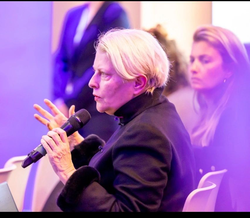March 11, 2025
Conferences

🌐follow Marie-Anne Frison-Roche sur LinkedIn
🌐subscribe to the Newsletter MAFR Regulation, Compliance, Law
🌐subscribe to the Video Newslette MAFR Surplomb
____
► Full Reference : M.-A. Frison-Roche, "Le juriste, requis et bien placé pour le futur" (The lawyer needed and well placed for the future), in Groupe Lamy Liaisons, Les Éclaireurs du Droit, Hôtel de l’Industrie, Place Saint Germain des Près, Paris, 11 March 2025, 16h.
____
This speech opens a series of 4 workshops on the following themes:
- The challenge of Trust
- The challenge of Risk
- The challenge of Transmission
- The challenge of leadership
____
🧮see the full programme of this manifestation (in French)
____
⬜see the slides basis made for this speech (which were not projected) (in French)
____
🎥 watch the short video made after the conference (in French)
____
► English Summary of this introductory conference: The 4 sessions will address the successive themes of trust, risk, transmission and leadership, which legal professionals are facing, particularly as a result of algorithms.
For an introductory analysis, it is possible to make a distinction inside the Future.
The future has a part of Stability: the jurist can contribute to this stability, i.e. the preservation of the past (I).
The future has an part of Predictability: the lawyer must increase this part in the present itself (II).
The future has a part of radical novelty (III): at this point, which may correspond to a precipice, if no one had imagined it, the lawyer can also be there. Until now, we think of lawyers more in the first 2 hypotheses, less in this one. Is it pertinent?
In each of these dimensions, the algorithmic system (AI) is presented as replacing or dominating the human.
In each of these 3 dimensions, Lawyers must be present, as they form a community that must remain united around the very idea of Law (algorithms do not conceive ideas, it is humans who transmit them to other humans, and the algorithmic system must remain a medium).
As far as the Stability of the future is concerned, the Lawyer can and must contribute to it, in particular through Transmission, because there is less of a blank page as algorithmic 'creation' is based on past data, and training, where the human being will be all the more central as machines have to be handled.
As far as the Predictability of the future is concerned, it is a question of assessing the Risks, whether specific or systemic, legal or non-legal, in order not to take them or on the contrary to take them. The more the Lawyer is involved in risk-taking, the more he or she will be in the right place, before and during the action.
As far as the Radically New future is concerned, it is not easy to qualify AI as such or not, but now the possible disappearance of the Rule of Law in the United States is one of them. All Lawyer are expected. Every lawyer must have two virtues (which the algorithm cannot not have): the virtue of Justice and the virtue of Courage. It is these virtues that we must pass on and share.
____
Current events have led me to devote the time available to me to focusing on a single perspective, the third, to say what is expected of Lawyers if we perceive something radically new in the near future, what everyone does.
Indeed, in the United States, on the one hand there is a head of state for whom the Law does not exist and who uses the power of regulation to express his absolute indifference to other states, companies and human beings, and on the other an entrepreneur who claims that he is going to become the master of algorithmic technology, a system over which he already wields great power.
Faced with this Radical Novelty, we expect the community of Lawyers, all lawyers, whatever their place, their technical mastery, their level, their nationality, to speak out and say No. As Kelsen, Cassin or Ginsberg did. Say No and help others to say No. To do this, Lawyers, as human beings who care about other human beings, must be aware of the twofold virtue expected of them: the virtue of commitment to Justice and the virtue of Courage.
________
Sept. 13, 2020
Thesaurus : Doctrine
►Référence complète : A. Maymont. ”Le droit de la compliance au secours de la stabilité financière”. Revue Banque, Revue Banque édition, 2020, pp. 50-53.
____
►Résumé de l'article : L'article reprend la définition du Droit de la Compliance comme ce qui prévient les risques de systèmes, notamment les "risques d'instabilité" qui affectent tout particulièrement les risques financiers, lesquels sont désormais principalement extra-financiers, notamment les cyber risques et les risques environnementaux et climatiques.
Il rappelle que le Droit de la Compliance incorpore le principe juridique de stabilité et confie aux autorités publiques le pouvoir d'inférer dans les contrats pour donner primauté à celui-ci. En matière de stabilité financière, c'est notamment l'ACPR et l'AMF qui le font.
Il souligne que pour être efficace, les régulateurs incitent les entreprises à coopérer. Leur action se justifie par l'ordre public financier, lequel évolue, le principe juridique de stabilité permet aux Autorités d'écarter les règles juridiques ordinaires, notamment la liberté contractuelle des banquiers, l'interdiction des ventes à découvert pendant le Covid étant une illustration de cela.
________
Jan. 16, 2020
Thesaurus : Doctrine
Reference: Patrick BOLTON - Morgan DESPRES - Luiz Awazu PEREIRA DA SILVA - Frédéric SAMAMA - Romain SVARTZMAN, The green swan: central banking and financial stability in the age of climate change, Banque des Règlements Internationaux, Janvier 2020
Aug. 1, 2003
Thesaurus : 02. Lois
Full reference: Loi n° 2003-706 du 1 août 2003 de sécurité financière (Law n° 2003-706 of 1st of August 2003 on financial stability)